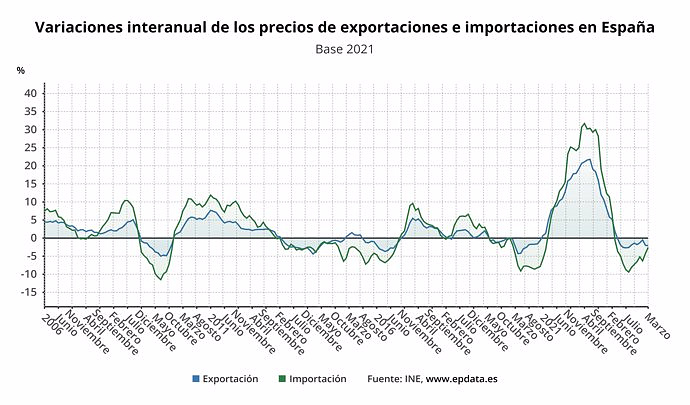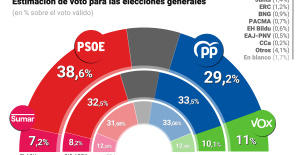On the other hand, Catalonia is one of the Autonomous Communities that has the largest deficit, of up to 30,000 million euros since 2013.
MADRID, 17 Dic. (EUROPA PRESS) -
Madrid and the Balearic Islands are the only autonomous communities that have added surpluses in contributory pensions during the last decade, accumulating up to 19,000 million and 4,000 million euros, respectively, in the midst of the debate on the single Social Security fund model due to the agreement between PSOE and PNV.
This is shown by the data provided since 2013 by the Ministry of Inclusion, Social Security and Migration, compiled by Europa Press, on the amounts of income and expenses in contributory pensions by autonomous communities, and which at the end of last year left Madrid and the Balearic Islands with a surplus, unlike much of the rest of the territories.
More specifically, the Community of Madrid has a cumulative total of 18,962 million euros, being the region in which income exceeds Social Security expenses in all of Spain to a greater extent since 2013. It is followed by the Balearic Islands, which has coupled a surplus of 4,187 million euros during the past decade.
At the end of 2022, Madrid obtained a surplus of 3,033 million euros, the highest figure since 2013. However, it has never been below 1,500 million euros, while it exceeded the 2,000 million positive difference for the first time in 2019. Since then it has never fallen below this figure, except in the year of the pandemic, when its positive difference fell to 1.7 billion euros.
For its part, the Balearic Islands registered a surplus of 611 million euros at the end of last year, although the year that accumulated the most money from Social Security was in 2019, with 692 million euros. The years with the least positive difference on expenses were 2020 (159 million euros) and 2013 (202 million euros).
On the opposite side is Catalonia, which is one of the autonomous communities with more expenses than income in Social Security since 2013. According to these data, the region chaired by Pere Aragonès has a total of 30,464 million euros of contributory deficit in the last decade.
In this context, the data show that at the end of 2022, Catalonia was also one of the communities with the largest negative balance between pension expenses and contribution income, which reached 2,839 million euros.
The year of the pandemic, Catalonia recorded its largest tax deficit, with almost 4 million euros of expenses above income, while the best data was in 2019, with a deficit of 2,514 million euros.
It is worth remembering that currently, the pension model in Spain is a distribution in which contributors pay the retiree subsidy through the single fund, regardless of the region in which they live.
And in that context, the Canary Islands are the third autonomous community that has accumulated the most surplus since 2013, with 2,871 million euros, although in 2021 it registered a deficit of almost one million euros, so it has not continuously recorded a higher percentage of income than expenses.
Among the territories that have had an accumulated deficit since 2013, the smallest is Murcia, with 414,417 euros. This is partly due to the fact that in three of the last ten years it has managed to register a surplus, being the fourth and last community to achieve it. Specifically, it obtained more income than expenses in the years 2019 (53,193 million euros), 2021 (128,615 million euros) and 2022 (105,535 million euros).
In this sense, according to data from the Ministry of Social Security, the autonomous cities of Ceuta and Melilla have continuously recorded surpluses for a decade, with 218 million and 314 million euros respectively. At the end of 2022, Ceuta accumulated 24 million euros more in income and expenses, while the amount for Melilla amounted to 34 million.

 Exploring Cardano: Inner Workings and Advantages of this Cryptocurrency
Exploring Cardano: Inner Workings and Advantages of this Cryptocurrency Seville.- Economy.- Innova.- STSA inaugurates its new painting and sealing hangar in San Pablo, for 18 million
Seville.- Economy.- Innova.- STSA inaugurates its new painting and sealing hangar in San Pablo, for 18 million Innova.- More than 300 volunteers join the Andalucía Compromiso Digital network in one month to facilitate access to ICT
Innova.- More than 300 volunteers join the Andalucía Compromiso Digital network in one month to facilitate access to ICT Innova.-AMP.- Ayesa acquires 51% of Sadiel, which will create new technological engineering products and expand markets
Innova.-AMP.- Ayesa acquires 51% of Sadiel, which will create new technological engineering products and expand markets Sentences of up to 7 years for four police officers for illegal detention and injuries to a young man in Barcelona
Sentences of up to 7 years for four police officers for illegal detention and injuries to a young man in Barcelona They investigate in Jaén the death of a six-year-old boy whose mother shows signs of self-harm
They investigate in Jaén the death of a six-year-old boy whose mother shows signs of self-harm The judge orders Rubiales to appear in court once a month and ask for permission if he travels abroad
The judge orders Rubiales to appear in court once a month and ask for permission if he travels abroad Scotland's First Minister resigns after the breakdown of the Government coalition
Scotland's First Minister resigns after the breakdown of the Government coalition How Blockchain in being used to shape the future
How Blockchain in being used to shape the future Not just BTC and ETH: Here Are Some More Interesting Coins Worth Focusing on
Not just BTC and ETH: Here Are Some More Interesting Coins Worth Focusing on They create a bank of machinery sounds to prevent breakdowns through artificial intelligence
They create a bank of machinery sounds to prevent breakdowns through artificial intelligence UPV students build a prototype of a wooden house to move to Equatorial Guinea
UPV students build a prototype of a wooden house to move to Equatorial Guinea The UA opens the call for the Impulso 2024 Awards for the best innovative business initiatives
The UA opens the call for the Impulso 2024 Awards for the best innovative business initiatives ALI, virtual assistant from Alicante, internationally recognized by the OECD
ALI, virtual assistant from Alicante, internationally recognized by the OECD A million people demonstrate in France against Macron's pension reform
A million people demonstrate in France against Macron's pension reform Russia launches several missiles against "critical infrastructure" in the city of Zaporizhia
Russia launches several missiles against "critical infrastructure" in the city of Zaporizhia A "procession" remembers the dead of the Calabria shipwreck as bodies continue to wash up on the shore
A "procession" remembers the dead of the Calabria shipwreck as bodies continue to wash up on the shore Prison sentences handed down for three prominent Hong Kong pro-democracy activists
Prison sentences handed down for three prominent Hong Kong pro-democracy activists ETH continues to leave trading platforms, Ethereum balance on exchanges lowest in 3 years
ETH continues to leave trading platforms, Ethereum balance on exchanges lowest in 3 years Investors invest $450 million in Consensys, Ethereum incubator now valued at $7 billion
Investors invest $450 million in Consensys, Ethereum incubator now valued at $7 billion Alchemy Integrates Ethereum L2 Product Starknet to Enhance Web3 Scalability at a Price 100x Lower Than L1 Fees
Alchemy Integrates Ethereum L2 Product Starknet to Enhance Web3 Scalability at a Price 100x Lower Than L1 Fees Mining Report: Bitcoin's Electricity Consumption Declines by 25% in Q1 2022
Mining Report: Bitcoin's Electricity Consumption Declines by 25% in Q1 2022 Oil-to-Bitcoin Mining Firm Crusoe Energy Systems Raised $505 Million
Oil-to-Bitcoin Mining Firm Crusoe Energy Systems Raised $505 Million Microbt reveals the latest Bitcoin mining rigs -- Machines produce up to 126 TH/s with custom 5nm chip design
Microbt reveals the latest Bitcoin mining rigs -- Machines produce up to 126 TH/s with custom 5nm chip design Bitcoin's Mining Difficulty Hits a Lifetime High, With More Than 90% of BTC Supply Issued
Bitcoin's Mining Difficulty Hits a Lifetime High, With More Than 90% of BTC Supply Issued The Biggest Movers are Near, EOS, and RUNE during Friday's Selloff
The Biggest Movers are Near, EOS, and RUNE during Friday's Selloff Global Markets Spooked by a Hawkish Fed and Covid, Stocks and Crypto Gain After Musk Buys Twitter
Global Markets Spooked by a Hawkish Fed and Covid, Stocks and Crypto Gain After Musk Buys Twitter Bitso to offset carbon emissions from the Trading Platform's ERC20, ETH, and BTC Transactions
Bitso to offset carbon emissions from the Trading Platform's ERC20, ETH, and BTC Transactions Draftkings Announces 2022 College Hoops NFT Selection for March Madness
Draftkings Announces 2022 College Hoops NFT Selection for March Madness























